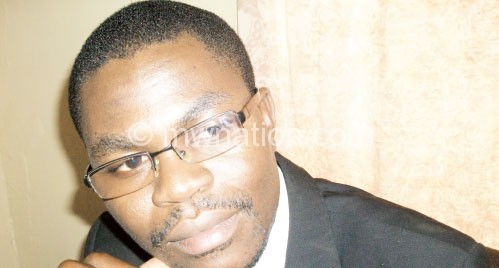Analysing the youth factor in this year’s elections

As presidential candidates presented their nomination papers last week, one thing that stood out was the presence of youthful leadership in most political parties. From UDF’s Atupele Muluzi, to DPP’s Saulos Chilima and PP’s Sosten Gwengwe, one can no longer deny that youths are a formidable force in Malawi’s politics. Political researcher Joseph Chunga shares his thoughts on this topic.
Q:
Why should we have youthful politicians in key positions of political influence? Is there evidence to show that youths make better leaders?
A:
People have been trying to note trends in terms of age and leadership in developed and developing countries. In developed democracies, people opt for relatively younger leaders compared to those in developing countries. But in terms of scientific data, I am yet to get hold of one. No studies have been done so far to provide evidence for this question. Like I have said, people just deduce that Africa’s retrogress can be related to age. However, for a democracy you are better off having a younger leader than an old one. One key challenge with the old guard—say a leader who is 80, is that they find it difficult to adapt to new ways of governing. And it is very difficult to change their mindset. Again, in terms of holding leaders accountable, I think it is imperative that we have younger leaders. We do not have enough time to hold old leaders accountable for decisions they took while in power. This, somehow, explains why they govern the country without a touch of sensitivity. Furthermore, a leader who is 80 barely cares about the future. Do they still have a future after all? Based on those points, I find it imperative for Malawi to have a younger leader.
Q:
We have a youthful presidential candidate. And we have two youthful running mates. Should we begin to celebrate the presence of youths in politics?
A:
If we consider that the older generation has started to accept that they cannot continue to keep the youth waiting, then we can really begin to celebrate. Whether the youth will translate or not, is another question. But the fact that the older generation has begun to recognise the youth, through deeds, is quite a big step.
Q:
Although we have never had a youthful president, we have, for years, had youths holding key public positions. Have they demonstrated that the youth can handle key political positions?
A:
If we delve into history, we find that our independence was not fought by the older generation. It was by youths. They are the ones that spearheaded the independence struggle and they were in the fore front inviting Kamuzu Banda to lead the fight against colonialism. Not only that. After we attained our independence youthful politicians were key in leading the debate on what course of development this country should take. There was an interesting hunt for national direction spearheaded by youthful Cabinet ministers such as Henry Masauko Chipembere, Kanyama Chiume and Willie Chokani. In fact, even if you look at Kamuzu Banda’s first Cabinet, it had a number of youths such as John Tembo and Aleke Banda. What I am trying to underline is that youths have been in key in politics since way back.
However, if you analyse the current trends, especially youthful parliamentarians, you tend to be sceptical with the relevance of youthful politicians. We are yet to see some of these youthful MPs articulating views that represent the needs and aspirations of the country’s youths. They tend to be defenders of their political masters. This, to a greater extent, questions why we should really have more youths in key political positions.
Q: Some argue that the current wind of youthful running mates is only an attempt by the old guard to use these youthful politicians to gain votes. After voting, they will be white elephants. What is your take on this?
A:
I think we are still disturbed with the continued vile relationship of the president and vice-president in the country. The likelihood of these guys being white elephants is quite high because the nature of power struggle between the two is high and has not been resolved. It is possible to have these quarantined in their offices.
Q: What spirit would you advise these youthful hopefuls to carry in the event that they get to power?
A:
What they are carrying is a symbolic representation of the youth. If elected, whatever decision they will make while in power will have serious repercussion on how posterity will judge how the youth will be treated. If they mess up, it will be difficult in the future to consider youths again.
Furthermore, I think these guys should rise above being youthful leaders. What they should mind is that they are not representing the youth in a particular fora. They are in high office; as a result, they should aim at getting better ways of managing the country regardless of age.
Q: Any other comment?
A:
I have been a little disturbed with how our presidential running mates have been considering youthful running mates as a way of getting votes from the youth. There is hardly evidence that youths in Malawi vote for fellow youths. To me, the decision is a gamble. It may not be responding to anything substantial. The youth factor won’t determine the winner.





